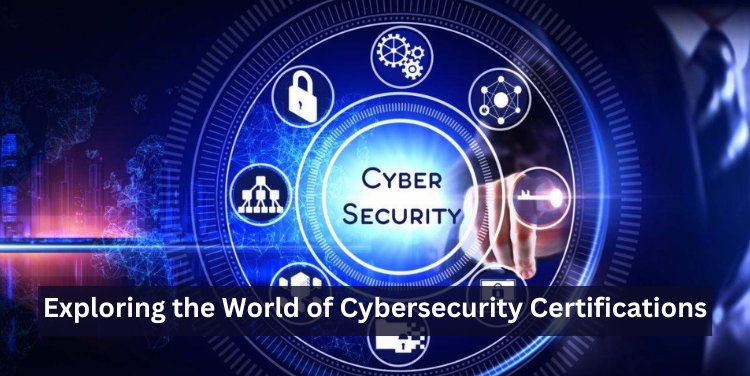In today’s digital era, where cyber threats are becoming more sophisticated and frequent, the demand for skilled cybersecurity professionals is soaring. Certifications in cybersecurity not only validate expertise but also play a pivotal role in career advancement. This blog delves into the realm of cybersecurity certifications, highlighting their importance, various types, and the benefits they offer to professionals at different stages of their careers.
Why Cybersecurity Certifications Matter
1. Validation of Skills and Knowledge
Cybersecurity certifications serve as formal proof of a professional's expertise and proficiency in specific areas of cybersecurity. They provide a standardized benchmark that employers can trust, ensuring that certified individuals possess the necessary skills to tackle complex security challenges.
2. Career Advancement
Certifications can significantly enhance career prospects. They open doors to new job opportunities, promotions, and higher salaries. In a competitive job market, having relevant certifications can set candidates apart from their peers.
3. Staying Current with Industry Trends
The field of cybersecurity is dynamic, with new threats and technologies emerging regularly. Many certifications require continuing education and periodic renewal, ensuring that certified professionals stay updated with the latest developments and best practices in the industry.
Key Cybersecurity Certifications
1. CompTIA Security+
Overview: CompTIA Security+ is an entry-level certification that provides a strong foundation in cybersecurity concepts. It covers topics such as network security, threat management, cryptography, and risk management. Who It's For: Ideal for beginners and those looking to start a career in cybersecurity. Benefits: It is a widely recognized certification that can serve as a stepping stone for more advanced certifications.
2. Certified Information Systems Security Professional (CISSP)
Overview: CISSP is a globally recognized certification for experienced professionals. It covers eight domains, including security and risk management, asset security, security engineering, and software development security. Who It's For: Suitable for mid-level and senior professionals aiming for managerial or leadership roles. Benefits: CISSP is highly regarded and often required for senior cybersecurity positions. It demonstrates a comprehensive understanding of cybersecurity principles and practices.
3. Certified Ethical Hacker (CEH)
Overview: CEH focuses on ethical hacking and penetration testing. It teaches professionals how to think like hackers to better defend against threats. Who It's For: Professionals interested in offensive security roles, such as penetration testers and ethical hackers. Benefits: CEH provides practical knowledge of hacking tools and techniques, making it valuable for those looking to specialize in ethical hacking.
4. Certified Information Security Manager (CISM)
Overview: CISM is tailored for management-focused individuals. It emphasizes the governance and management of an enterprise’s information security program. Who It's For: Professionals seeking managerial roles in cybersecurity. Benefits: CISM aligns cybersecurity practices with business goals, making it ideal for those in or aspiring to management positions.
5. Offensive Security Certified Professional (OSCP)
Overview: OSCP is known for its hands-on approach to cybersecurity. Candidates must complete a practical exam that involves exploiting vulnerabilities and gaining control of systems. Who It's For: Professionals aiming for roles in penetration testing and offensive security. Benefits: OSCP is highly regarded for its rigorous and practical nature, demonstrating a high level of technical proficiency.
6. Certified Cloud Security Professional (CCSP)
Overview: With the rise of cloud computing, CCSP focuses on cloud security architecture, governance, and risk management. Who It's For: Professionals working with or managing cloud technologies. Benefits: CCSP validates expertise in securing cloud environments, which is increasingly important as more organizations move to the cloud.
Choosing the Right Certification
Selecting the right certification depends on various factors:
- Career Goals: Identify whether you want to focus on technical roles, management, or a specific area like cloud security.
- Experience Level: Choose a certification that matches your current level of experience. Entry-level certifications like CompTIA Security+ are suitable for beginners, while advanced certifications like CISSP and OSCP are better for experienced professionals.
- Industry Demand: Research which certifications are most valued in your desired job market or industry.
Preparing for Certification Exams
Study Resources
Utilize a variety of study materials, including official guides, online courses, and practice exams. Engaging with study groups or online forums can also provide valuable insights and support.
Practical Experience
Hands-on experience is crucial, especially for certifications like OSCP. Setting up a home lab or participating in Capture the Flag (CTF) competitions can help build practical skills.
Time Management
Create a study schedule that allows ample time to cover all necessary material without feeling overwhelmed. Consistent, focused study sessions are more effective than last-minute cramming.
In the ever-evolving field of cybersecurity, certifications are a powerful way to validate skills, stay current with industry trends, and advance your career. Whether you are just starting or looking to specialize, there is a certification that can help you achieve your professional goals. Invest in your education, stay curious, and continuously seek opportunities to learn and grow in this exciting and critical field.







